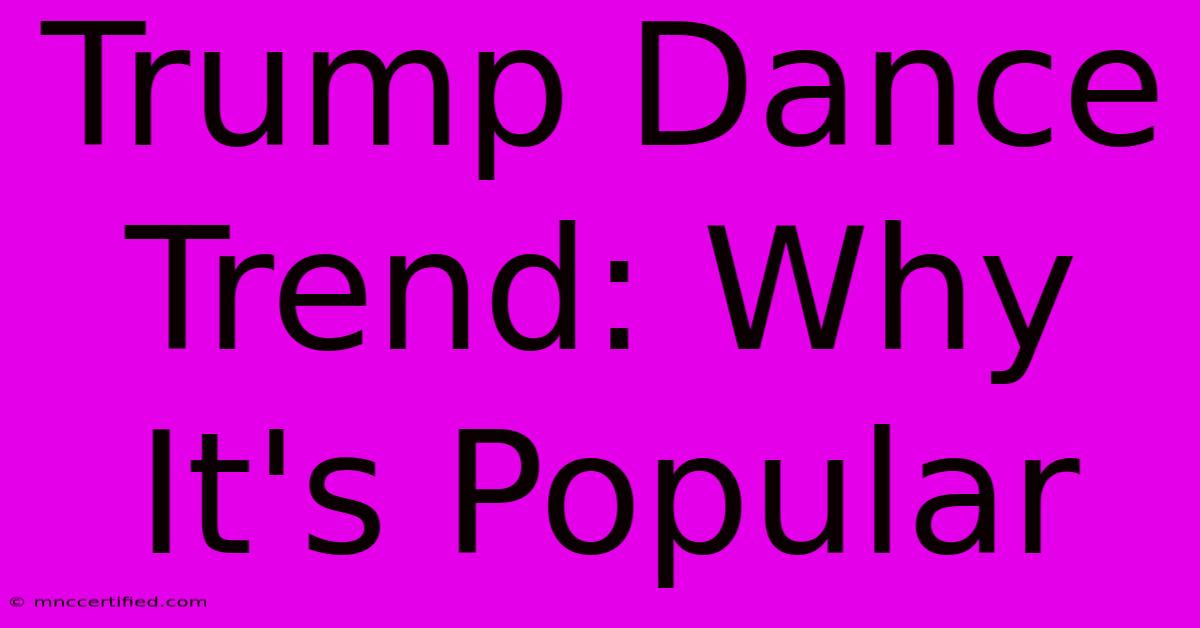Trump Dance Trend: Why It's Popular

Table of Contents
Trump Dance Trend: Why It's Polarizing and Popular
The "Trump Dance," a seemingly simple yet highly divisive online trend, has captured significant attention, sparking conversations far beyond the usual viral video sphere. This article delves into the reasons behind its popularity, examining the cultural, political, and social factors fueling its spread across various platforms. We'll explore the psychology of meme culture and how this particular trend taps into deep-seated emotions and opinions.
Understanding the Phenomenon: More Than Just a Dance
The Trump Dance isn't just a dance; it's a symbol. Videos depicting individuals (often mimicking Donald Trump's mannerisms) performing a specific set of moves have gone viral, prompting both enthusiastic participation and fierce criticism. This isn't simply about dance moves; it's about expressing, often indirectly, opinions about a highly controversial political figure.
The Role of Political Polarization
The trend's popularity is inextricably linked to the deeply polarized political climate. For supporters, the dance acts as a form of celebratory expression, a joyful affirmation of their political alignment. It's a way to publicly show support without explicitly stating political positions, tapping into a sense of community and shared identity. Conversely, for opponents, the dance is a symbol of mockery and disdain, highlighting what they perceive as the absurdity or dangerousness of Trump's policies and persona.
Meme Culture and Viral Spread
The Trump Dance owes its rapid spread to the mechanics of meme culture. Short, easily replicable videos are ideal for viral dissemination across platforms like TikTok, Instagram, and YouTube. The simplicity of the dance allows for variations and personal interpretations, encouraging user-generated content and increasing its reach organically. This organic growth is a critical factor in its success, surpassing traditional marketing strategies.
The Power of Irony and Satire
Many participants employ irony and satire in their videos. The juxtaposition of the seemingly innocuous dance moves with the context of Trump's political persona creates a powerful comedic effect. This use of humor allows for a more nuanced expression of opinions, catering to a broader audience than direct political commentary. This ironic approach is crucial to its appeal, attracting viewers from both sides of the political spectrum, even if for different reasons.
Analyzing the Psychology Behind the Trend
The Trump Dance's popularity speaks volumes about the psychology of online engagement. It provides a safe space for individuals to express their opinions, even controversial ones, through a non-confrontational medium. The dance allows for participation without the necessity of direct, potentially hostile engagement with opposing viewpoints.
Emotional Release and Group Identity
The act of participating in the trend can be seen as a form of emotional release. For supporters, it's a way to celebrate and connect with like-minded individuals; for opponents, it might be a way to vent frustration and express disapproval in a less confrontational manner than direct political debate. Either way, it fosters a sense of group identity and belonging.
The Importance of Context and Interpretation
It's crucial to acknowledge that the meaning and impact of the Trump Dance vary dramatically depending on individual interpretation and context. The same video can be viewed as celebratory or mocking, depending on the viewer's political leanings and prior understanding. This subjectivity is a key element of its widespread appeal, making it a topic of conversation and analysis across diverse groups.
The Long-Term Impact and Future Trends
The Trump Dance, though seemingly trivial, offers a fascinating case study in viral trends and their interplay with political discourse. Its impact extends beyond its immediate virality, highlighting the power of meme culture in shaping public opinion and facilitating social interaction. Future research might explore how such trends impact political engagement and communication in the digital age. The longevity of this trend and the evolution of its iterations will be interesting to observe.
Keywords: Trump Dance, Viral Trend, Political Meme, Meme Culture, TikTok Trend, Social Media, Political Polarization, Online Engagement, Viral Video, Donald Trump, Satire, Irony, User-Generated Content, Political Commentary.

Thank you for visiting our website wich cover about Trump Dance Trend: Why It's Popular. We hope the information provided has been useful to you. Feel free to contact us if you have any questions or need further assistance. See you next time and dont miss to bookmark.
Featured Posts
-
So Cal Thanksgiving Record Travel Numbers Predicted
Nov 19, 2024
-
Croatia Vs Portugal Uefa Nations Live Stream
Nov 19, 2024
-
Brad Pitts Son Knox New Photo
Nov 19, 2024
-
Starmer Rejects Budget Blame For Mortgage Rise
Nov 19, 2024
-
So Cal Thanksgiving Travel Record High Expected
Nov 19, 2024